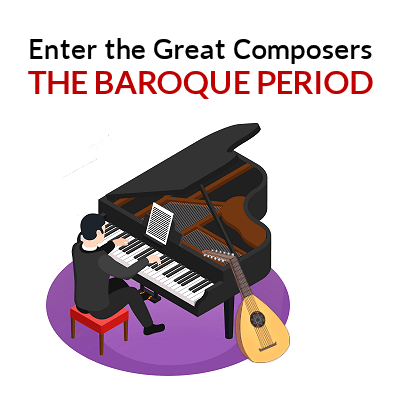DID YOU KNOW? Italian born French composer Jean-Baptiste Lully purchased patents from the monarchy to be their sole composer and prevent others from staging operas.

There are three periods of musical discovery that were beat into our heads from the sixth grade through college, probably because they're the most influential and applied eras of innovation and invention in musical history. The Baroque, Classical, and Romantic Periods are eras that you should be well acquainted with. I'll touch base on these but would suggest any serious musician further their education on these predominant musical periods of accomplishment.
During the Baroque Period (approx. 1560 to 1780) music became very instrumental and very vocal, not to mention that the dancers wanted to get in on a good thing as well. Now we're about to learn what music is truly for by applying real mathematics coupled with never before heard emotional style. Better instruments were invented along with vast improvements to several existing key instruments such as the viole da braccio which became the violin as we know it.
Just think of it! It's really very easy to follow the historical path through the series of events which brought music to heights as never before. Here musical theory enveloped man's plight by way of European composers who so loved the song they dreamed up sonatas, concertos and fugues. A whole orchestra of musical styles burst forth. From the opera to ballet, a suite or a chorale, and in symphony they screamed terms such as, "Forte'!" or "Allegro!" to the many founded musical variations placed carefully anew on the staves of the major and minor scaling system. As the Italian Renaissance came to a close, through expansion and improvements of instrumentation along with numerous new playing styles and composing forms in Baroque music, it was official; the chorus and ensembles had now become the symphony orchestra.
The period was the turning point of destiny for the entire musical concept: to produce art and provide an enjoyable form of entertainment. Now we begin perfecting the science of sound distribution. The stage was set; the final ingredients folded in. It was time. It was emotion. It was trust, devotion, happiness or sorrow, and everything else inside that makes us want to whistle or whine. The Baroque years gave music its real meaning and its certain future. It was as good as the Blues.




Claudio Monteverdi
Johann Sebastian Bach
Georg Friederich Händel
Jean-Philippe Rameau


